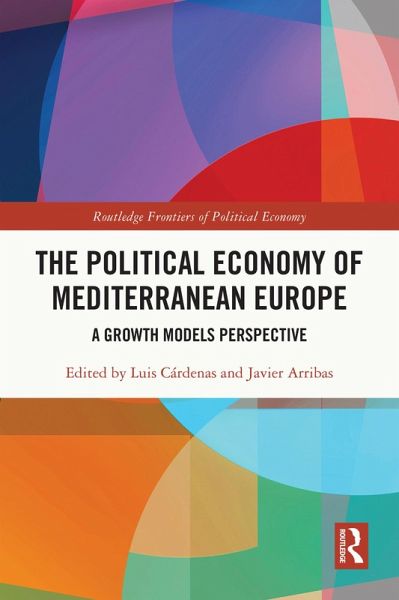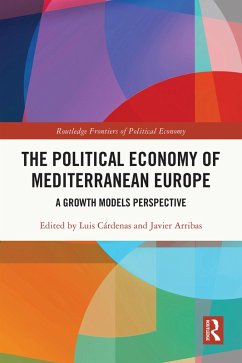
The Political Economy of Mediterranean Europe (eBook, PDF)
A Growth Models Perspective
Redaktion: Cárdenas, Luis; Arribas, Javier
Versandkostenfrei!
Sofort per Download lieferbar
42,95 €
inkl. MwSt.
Weitere Ausgaben:

PAYBACK Punkte
21 °P sammeln!
Applying the demand-led growth models framework, this book examines the recent macroeconomic performance of the key Mediterranean economies - Italy, Spain, Portugal and Greece - including the responses to the economic and financial crisis (2008), the debt crisis (2010) and the COVID-19 crisis (2020).As the book explains, the central idea of the growth model approach is that the widespread breakdown of the old labor institutions, such as the existence of strong unions, centralized wage bargaining and the participation of the workforce in corporate governance, has led to a fall in the wage share...
Applying the demand-led growth models framework, this book examines the recent macroeconomic performance of the key Mediterranean economies - Italy, Spain, Portugal and Greece - including the responses to the economic and financial crisis (2008), the debt crisis (2010) and the COVID-19 crisis (2020).
As the book explains, the central idea of the growth model approach is that the widespread breakdown of the old labor institutions, such as the existence of strong unions, centralized wage bargaining and the participation of the workforce in corporate governance, has led to a fall in the wage share and a rise in inequality in most advanced economies. Thus, the two main contemporary growth models are usually characterized as debt-led and export-led. In both models, the same processes that cumulatively drive growth, such as over-consumption, also simultaneously undermine the foundations on which this expansion takes hold.
The book examines the extent to which these processes hold true for Mediterranean economics and explores the key factors of their economies including productive capacity, growth of aggregate demand components, wage-led or profit-led regimes, personal income distribution, the foreign sector, the financial sector, labor relations, the labor market and welfare states. In particular, the book examines whether policy responses and state interventions in recent years have led to a divergence between the economies. To what extent are these changes transforming the existing growth models? Are we facing a change in the Mediterranean model or the disappearance of the Mediterranean bloc as a whole?
This book marks a significant addition to the literature on the economics and politics of Southern Europe and the fields of political economy, comparative economics, and macroeconomics more broadly.
As the book explains, the central idea of the growth model approach is that the widespread breakdown of the old labor institutions, such as the existence of strong unions, centralized wage bargaining and the participation of the workforce in corporate governance, has led to a fall in the wage share and a rise in inequality in most advanced economies. Thus, the two main contemporary growth models are usually characterized as debt-led and export-led. In both models, the same processes that cumulatively drive growth, such as over-consumption, also simultaneously undermine the foundations on which this expansion takes hold.
The book examines the extent to which these processes hold true for Mediterranean economics and explores the key factors of their economies including productive capacity, growth of aggregate demand components, wage-led or profit-led regimes, personal income distribution, the foreign sector, the financial sector, labor relations, the labor market and welfare states. In particular, the book examines whether policy responses and state interventions in recent years have led to a divergence between the economies. To what extent are these changes transforming the existing growth models? Are we facing a change in the Mediterranean model or the disappearance of the Mediterranean bloc as a whole?
This book marks a significant addition to the literature on the economics and politics of Southern Europe and the fields of political economy, comparative economics, and macroeconomics more broadly.
Dieser Download kann aus rechtlichen Gründen nur mit Rechnungsadresse in A, B, BG, CY, CZ, D, DK, EW, E, FIN, F, GR, HR, H, IRL, I, LT, L, LR, M, NL, PL, P, R, S, SLO, SK ausgeliefert werden.













